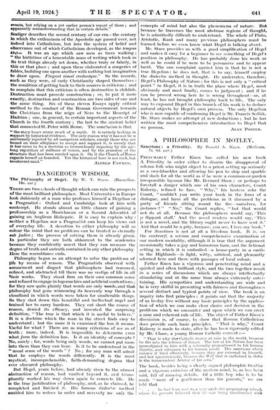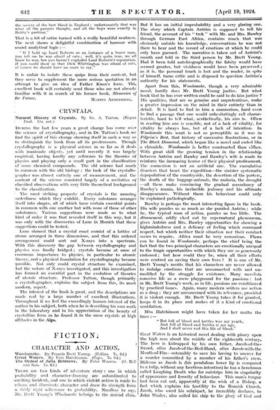A PHILOSOPHER IN MOTLEY.
PRESUMABLY Father Knox has called his new book A Frivolity in order either to disarm the disapproval of solemn folk who might object to a priest setting up seriously
as a swashbuckler and allowing his pen to skip and sparkle and slash for all the world as if he were a common-or-garden irresponsible layman like Mr. Bernard Shaw ; or perhaps to
forestall .a danger which one of his own characters, Count Kalociy, refused to face. " Why," his hostess asks the Count, " couldn't you write your book in the form of a dialogue, and have all the problems in it discussed by a party of friends sitting round the fire—ourselves, for instance ? " " No," the Count replies, " but that would not. do at all. Because the philosophers would say, This is flippant stuff.' And the novel readers would say, This is not a novel, and the library ought never to have sent it.' And that would be a pity, because, you see, I love my book." For Sanctions is not at all a frivolous book. It is, on
the contrary', a serious and comprehensive examination of our modern mentality, although it is true that the argument occasionally takes a gay and humorous turn, and the fictional setting in which it is embodied—a house-party in a castle in the Highlands—is light, witty, satirical, and pleasantly adorned here and there with passages of local colour.
Father Knox has -a vigorous and penetrating mind and a spirited and often brilliant style, and the two together result in a series of discussions which are always intellectually stimulating and. at the same time always extremely enter- taining. His sympathies and understanding arc wide and he is very skilful in presenting with fairness and thoroughness several. distinct and typical points of view. The book is an inquiry into first principles.; it points out that the majority of us to-day live without any basic principles by the applica- tion-of which we can make clear choice and decision in the problems which we. encounter and upon which we can erect a sane and coherent rule of life. The object of Father Knox's disetis-Sion is; of course, to show that Roman Catholicism
does provide such basic principles. " That is why," Count Kaloczy is made to state, after he has been rigorously edited by Mr. Chase, a young Roman Catholic convert :—
" That is why the' Catholic moves at ease in the world, because he fits into the scheme of things. The law of his Nature has been promulgated to him with a solemnity proportioned to his human dignity, tend adequate to his human needs. The sanctions which enfoFe. it bind effectively, because they are external to himself, and hot ignoMiniously, because the Will that is enshrined in them is the transcendent Arbiter of his own."
The book, besides being a clearly argued philosophic treatise and a vigorous. criticism of the modern mind, is, as has been said, full of amusing details. Of a little bey who is to be made " more of a gentleman than his parents," we are
told that
. he had.bz,en scat to a very oxcle'ivc preparatory school, where Isw parents believed tint he was being familiarized with
the society of the best blood in England ; unfortunately that was what all the parents thought, and all the bOya were exactly m Bobby's position."
That is a bit of satire -turned with a really beautiful neatness. The next shows a delightful combination of humour with sound analytical logic :- " If I hold up Lord Roberts as an instance of a brave man, you tell me he was afraid of cats ; well, it's quite true, we all know he was, but you haven't exploded Lord Roberts's reputation. if you could show us that Dick Whittington was afraid of cats, of course we should have no more to say."
It is unfair to - isolate these quips from their context, but they serve to supplement the more serious quotation in an -Attempt to give an idea. of Father Knox's form. This excellent book will-certainly send those who:are not already familiar with it in search of his former book, Memories of



































 Previous page
Previous page